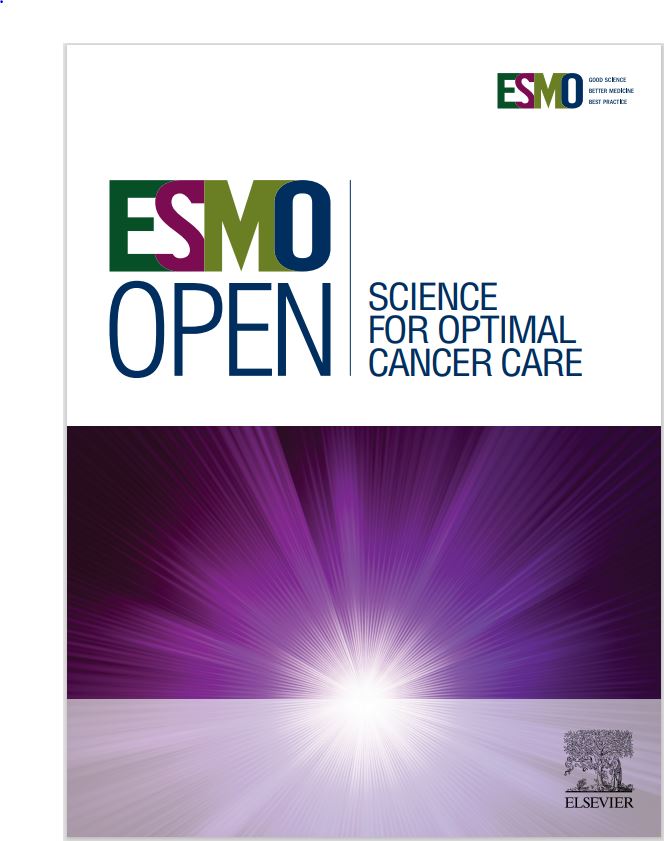提高精准肿瘤学:分子肿瘤板在ESCAT II-III改变的早期识别和靶向治疗中的作用
IF 8.3
2区 医学
Q1 ONCOLOGY
引用次数: 0
摘要
高通量技术的广泛应用促进了精准医学的兴起。欧洲肿瘤医学学会(ESMO)分子靶点临床可操作性量表(ESCAT)指导治疗决策,对于ESCAT I的改变,特异性靶向治疗的作用是毋庸置疑的。然而,抑制ESCAT II和III改变的影响需要进一步阐明。本研究旨在评估一种实验性分子匹配方法对ESCAT II-III级改变的晚期实体瘤患者的潜在益处。材料和方法我们分析了2020年1月至2023年12月在我们的机构分子肿瘤委员会(MTB)中来自1230名晚期癌症患者的下一代测序数据。出现ESCAT I-III级改变的患者被选择接受标准的分子匹配治疗或早期临床试验中的实验性治疗。结果1230例连续晚期癌症患者中,共有1091例(88.7%)存在至少一种分子改变,分为ESCAT I级(n = 415, 33.8%)、ESCAT II-III级(n = 391, 31.8%)和ESCAT IV-X级(n = 285, 13.6%)。出现ESCAT I级改变的214例(49.2%)患者接受了靶向治疗,而31例(7.9%)ESCAT II-III级改变的患者参加了早期临床试验。在ESCAT II-III级改变的患者中,分子匹配治疗与更好的总生存期(OS)相关(单变量Cox风险比0.46,P = 0.002),中位OS为31个月,而不是11个月。此外,ESCAT II-III型改变患者接受实验治疗作为二线治疗的中位无进展生存期为4.0个月,高于随后接受新药物治疗的患者(2.0个月)。结论我们的研究强调了MTBs通过精确识别可操作的分子改变在优化晚期癌症患者临床结果中的关键作用。我们的研究结果强调了将ESCAT II和III改变纳入精准医学框架的必要性,以扩大治疗机会,以及早期靶向驱动改变的重要性。本文章由计算机程序翻译,如有差异,请以英文原文为准。
Enhancing precision oncology: the role of molecular tumor boards in early identification and targeted treatment of ESCAT II-III alterations
Background
The wide use of high-throughput technologies has facilitated the rise of precision medicine. The European Society for Medical Oncology (ESMO) Scale for Clinical Actionability of molecular Targets (ESCAT) guides treatment decisions, and for ESCAT I alterations, the role of specific targeted therapy is unquestionable. Nevertheless, the impact of inhibiting ESCAT II and III alterations needs to be further elucidated. This study aims to evaluate the potential benefit of an experimental molecular-matched approach for patients diagnosed with advanced solid tumors harboring ESCAT tier II-III alterations.
Materials and methods
We analyzed the next-generation sequencing data from 1230 advanced cancer patients between January 2020 and December 2023 in our institutional molecular tumor board (MTB). Patients presenting with ESCAT tier I-III alterations were selected to receive either standard molecular-matched therapy or an experimental treatment in early-phase clinical trials.
Results
A total of 1091 of 1230 consecutive advanced cancer patients (88.7%) harbored at least one molecular alteration, which was classified as ESCAT tier I (n = 415, 33.8%), ESCAT tier II-III (n = 391, 31.8%), and ESCAT tier IV-X (n = 285, 13.6%). Two hundred and four (49.2%) patients presenting ESCAT tier I alterations were treated with targeted therapies, whereas 31 patients (7.9%) harboring ESCAT tier II-III alterations were enrolled in early-phase clinical trials. Among patients with an ESCAT tier II-III alteration, a molecular-matched therapy was associated with better overall survival (OS) (univariable Cox hazard ratio 0.46, P = 0.002), with a median OS of 31 versus 11 months. In addition, patients with ESCAT II-III alterations who received experimental therapies as second line demonstrated a median progression-free survival of 4.0 months, higher than those receiving a new agent afterward (2.0 months).
Conclusions
Our study underscores the critical role of MTBs in optimizing clinical outcomes for patients with advanced cancer through precise identification of actionable molecular alterations. Our findings highlight the necessity of incorporating ESCAT II and III alterations into precision medicine frameworks to expand therapeutic opportunities and the importance of earlier targeting of driver alterations.
求助全文
通过发布文献求助,成功后即可免费获取论文全文。
去求助
来源期刊

ESMO Open
Medicine-Oncology
CiteScore
11.70
自引率
2.70%
发文量
255
审稿时长
10 weeks
期刊介绍:
ESMO Open is the online-only, open access journal of the European Society for Medical Oncology (ESMO). It is a peer-reviewed publication dedicated to sharing high-quality medical research and educational materials from various fields of oncology. The journal specifically focuses on showcasing innovative clinical and translational cancer research.
ESMO Open aims to publish a wide range of research articles covering all aspects of oncology, including experimental studies, translational research, diagnostic advancements, and therapeutic approaches. The content of the journal includes original research articles, insightful reviews, thought-provoking editorials, and correspondence. Moreover, the journal warmly welcomes the submission of phase I trials and meta-analyses. It also showcases reviews from significant ESMO conferences and meetings, as well as publishes important position statements on behalf of ESMO.
Overall, ESMO Open offers a platform for scientists, clinicians, and researchers in the field of oncology to share their valuable insights and contribute to advancing the understanding and treatment of cancer. The journal serves as a source of up-to-date information and fosters collaboration within the oncology community.
 求助内容:
求助内容: 应助结果提醒方式:
应助结果提醒方式:


